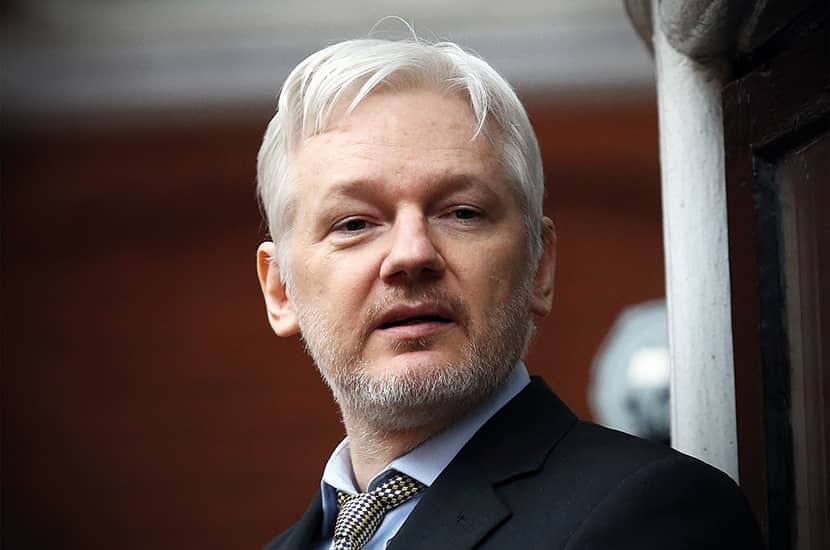A question looms throughout this book: is it better to die rather than experience the wrath of a publicly shamed America?
The story begins in 2018 when Nils Melzer, a UN Special Rapporteur on torture, received an email: ‘Julian Assange is seeking your protection.’ Melzer’s office receives approximately 50 requests for help each week, and he was initially dismissive of this one. He believed the founder of WikiLeaks was ‘hiding out in an embassy somewhere because of rape allegations’. A few months later, Assange’s lawyers made contact again. This time Melzer read the documents forwarded to him and changed his mind: ‘I began to wake up to my own prejudice.’
That was in 2019, and Assange’s lawyers feared their client was about to be booted out of the Ecuadorian embassy in London and extradited to ‘the blackhole of a US supermax prison’ — Melzer’s words. With permission from the British government, Melzer arranged to visit Assange at the embassy; but two weeks before his scheduled meeting it opened its doors and the British police arrested Assange. He was sent to Belmarsh prison.
Assange was sentenced to 50 weeks in Belmarsh prison but has now served nearly three years
His crime was failing to surrender to custody seven years earlier, for which he was sentenced to 50 weeks. A month later, Melzer organised a visit to him in prison instead, along with two doctors to assess his well-being. Melzer describes the security, cell number 37, checking the examination room for cameras and microphones (he acknowledges this was probably futile) and meeting Assange for the first time:
My impression… was that of a highly intelligent, mentally extremely resilient man, who was desperately trying to retain some measure of control over his own fate, even though it was obvious that he was no longer in charge.
The most enlightening section of the book, however, covers what happened in Sweden. During a trip there in 2010, Assange was accused by two women of sex crimes. Their identity ended up being ‘common knowledge’, and Melzer pieces together material to try to understand what happened: ‘I feel awful,’ one of the women texts a friend: ‘It’s already in the news, even though it was supposed to be confidential.’
Melzer also includes a revealing text message exchange between the Swedish prosecutor and Assange’s lawyer. The prosecutor proposes a date to interview Assange about the accusations. The lawyer replies that he cannot reach his client. Assange then books a flight and leaves the country (his bag containing laptops and hard drives disappears en route). Melzer writes: ‘There is no evidence that Assange was aware of the interview scheduled for him on 28 September or that he left Sweden knowing that the prosecutor still wanted to interview him at all.’
There are times when a more appropriate title for Melzer’s book might have been The Defence of Julian Assange. Readers will regularly feel the urge to check the other side of the story. An example is when Melzer blames journalists at the Guardian and Der Freitag for unwittingly enabling ‘any interested party’ to access a batch of WikiLeaks documents. The Guardian published a statement at the time which denied responsibility, but this is omitted by Melzer, and the book is weakened for not grasping such nettles.
After leaving Sweden, Assange made his way to the UK. He told the Swedish prosecutor he would conduct a video interview, but she declined. Instead, Sweden tried to extradite him. Assange appealed, lost the appeal, then failed to turn up to court and hid in the Ecuadorian embassy for almost seven years. Public support dwindled. He had uncovered the killing of innocent people, but many were unable to separate his WikiLeaks work from the allegation of rape.
The Swedish cases have since been dropped or have expired; but America is seeking to extradite Assange on espionage charges. Initially the request was rejected by a British judge, due to the risk of Assange killing himself. America’s Special Administrative Measures (SAMs), meaning isolation and extreme restrictions, pre-trial and post-trial, were the concern. The case of Babar Ahmad (worth a Google for those interested in trans-Atlantic justice) was referenced.
In response, America has promised that Assange will not be subject to SAMs or sent to a supermax prison. Now Assange has to persuade the Supreme Court in this country to hear an appeal. Melzer predicts the legal course, and points out that many prisoners in the US who are not held under SAMs are held under Administrative Segregation, Restrictive Housing or Involuntary Protective Custody. There are many ways to skin a cat.
The material Melzer has gathered over his two-year investigation is riveting, and his motivation is clear. Having been sentenced to serve 50 weeks, Assange has now been in Belmarsh for nearly three years. When Melzer first met him, Assange held his hand and asked him to do something: ‘Please, save my life.’ That is why he has written this book.






Comments